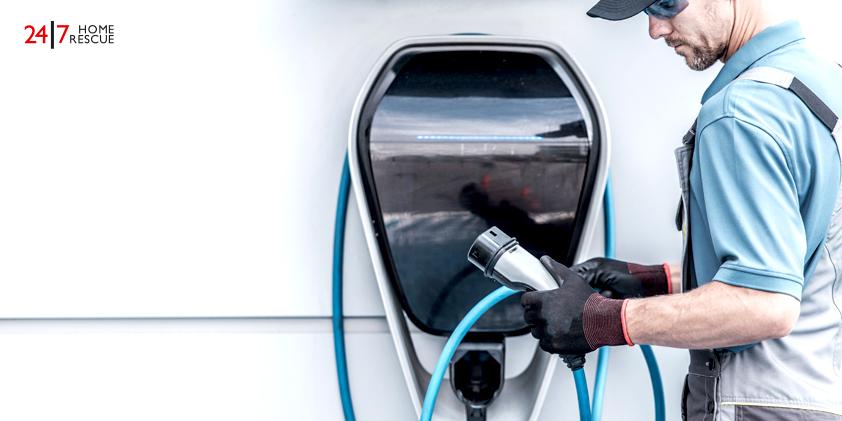Updated on 8th December, 2023 by Martin Astley
We all know the benefits of electrical vehicles and EV chargers’ installation in our homes. But with rising benefits, there are also some drawbacks and the most common issue faced by people regarding EV chargers is how to unplug electric car chargers. This problem may sound simple, but many EV owners have faced this situation in which their chargers get stuck and won’t come out. So, the million-dollar question that many EV owners ask is: if there is a right way to unplug EV chargers?
Yes, there is! And if you don’t unplug your car charger the right way, you could damage your electric car as well as the charger.
In this article, we’ll discuss the reasons why EV chargers get stuck, what are the potential reasons and how to deal with that kind of situation.
Let’s get started!
How to Unplug an Electric Car Charger Safely?

The simple way is to find the release button on the charger and push it in. This will unlock the connector and allow you to remove it from the car. Then, use the tool that comes with the charger to remove the plug from the socket. Be careful not to damage the connector and make sure the plug is completely disconnected from the socket before putting it away.
Important Factors to Consider Before Unplugging an Electric Car Charger!
1. Unplug the Charger Before Removing it From the Outlet

You should always unplug your charger before attempting to remove it from the outlet. This is for your safety and the safety of your electric car.
If you have an electric car, then you know the importance of having a good charger. And you also know that it’s important to unplug the charger properly when you’re done using it.
If you don’t unplug your charger properly, there’s a good chance that it will get stuck, and you’ll have a hard time getting it out of the outlet. This can be a real pain, especially if you need to use the outlet for something else.
So, make sure you unplug your charger properly every time. It’s easy to do, and it will help keep you and your car safe.
2. Refer to Your Equipment Instruction Manual If Your EV Charger Won’t Unplug
So, you’ve just finished charging up your electric car and it’s time to head out for the day. But before you do, you need to unplug the charger from the wall. Easy enough, right?
Not so fast. If you have an electric car charger that’s installed in your home, there’s a good chance you’ll run into a situation in which EV charger won’t unplug. This is because different chargers have different instructions on how to remove them. Some chargers have a lever or a button that you need to press to release the connector.
Others have a twist-lock mechanism that needs to be turned counter-clockwise to unlock it. And still, others have a pull-cord that you need to tug on to release the connector.
So, before you try unplugging your electric car charger, make sure you know how it’s done. That way, you won’t end up with a charger that’s stuck on your wall, leaving you frustrated.
3. Check for Any Sign of Damage
If you’re having trouble unplugging your charger, the first thing you should do is check for damage. If the charger is damaged in any way, it may be difficult or even dangerous to remove. So, it’s important to get it fixed before you start having any problems.
4. Use the Right Tools
If you have an electric car, you’re probably using an electric car charger to power it up. And if you’re like most people, you probably don’t want to think about how to unplug it. But if you ever do find yourself in this situation, don’t worry—we’re here to help.
The first thing you need to do is make sure you have the right tools. Most electric car chargers come with a little tool that helps you remove the plug. If you don’t have this tool, or if it’s broken, you can try using a small screwdriver or a butter knife. Just be careful not to damage the plug or the charger.
5. Be Patient and Remove the Charger Gently
When you’re ready to remove your electric car charger, be patient. If you try to yank it out or pull on the cords, you might damage them—or even worse, the charger itself. Instead, take a few deep breaths and relax. Gently wiggle the charger until it comes free. If it’s still stuck, try using a little force, but be careful not to damage anything.
And remember, if you ever have any questions about unplugging your electric car charger, be sure to reach out to your local electrician. They’ll be more than happy to help!
6. Seek Professional Help If You’re Still Having Trouble
You may be wondering what to do if you’re still having trouble unplugging your electric car charger. Well, the best thing to do is seek help from a professional.
There are a lot of things that can go wrong when you’re trying to unplug your electric car charger, and it’s best to leave it to the experts. They’ll be able to help you troubleshoot the problem and get your charger working properly in no time.
Conclusion
We hope that this article has substantially answered your question that is, how to unplug an electric car charger. and probably you now know the right way to unplug your electric car charger! If you still have any questions or concerns, feel free to reach out to us for assistance. We’re always happy to help.
FAQ’s
Q1. Why can’t I unplug my electric car?
The reason behind it is that, when you plug the charger into the vehicle’s charging port, the cable gets locked which makes it difficult for random people to remove it. The right way to do it is that once the charging is finished, you should unlock the charger and then unplug it. If you want to know more regarding how to properly unplug an EV charger, then read the instruction manual or contact your EV charger provider for further guidance.
Q2. Can you unplug an electric car while charging?
You need to understand that when you plug in the EV charger to a port it gets locked until the vehicle is fully charged. So, unplugging it while charging might cause damage to your vehicle and your charger. Until and unless there is an emergency- you need to rush somewhere in hurry then properly remove the charger following the instruction manual or expert advice.

